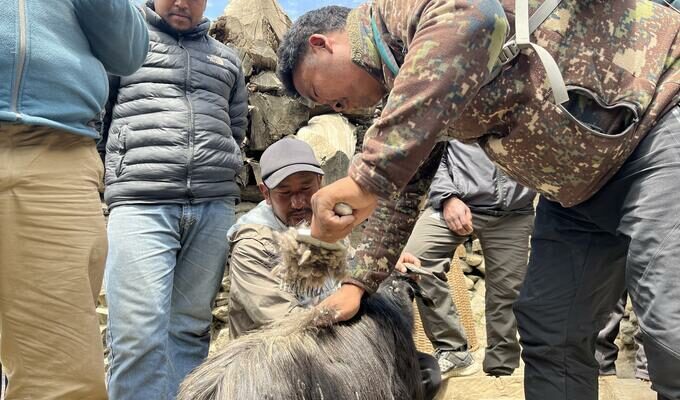Legal Documents
ITC partners with national private and public stakeholders and the World Bank to establish a Nepali value chain for the Pashmina sector.

ITC partners with national private and public stakeholders and the World Bank to establish a Nepali value chain for the Pashmina sector.
The International Trade Centre (ITC) recognizes that ‘Partnerships4Purpose’ can contribute to impactful projects and sustainable outcomes. To celebrate the teamwork behind these efforts, ITC is proud to highlight game-changing initiatives that are made possible through strong and meaningful collaboration.
Nepal exports about $27 million of pashmina products per year using imported cashmere yarns from neighbouring countries. At the same time, Nepal has an estimated 140,000 Chyangra goats whose fibres are not used.
To address the challenge of the country’s broken supply chain for Pashmina, ITC is working with various partners, who bring together farmers, manufacturers, traders and exporters of Pashmina products.
Together with the Nepal Pashmina Industry Association (NPIA), the Nepal Pashmina Fibre Processing Company (NPFPC), and the Mustang Chyangra Farmers' Association (MCFA), ITC’s European Union-funded Trade and Investment Programme provides the needed know-how, tools and market linkages for farmers to harvest the fibre for profit.
The unique approach: Techniques plus market linkages
Most farmers did not recognise the value of the fibre of their goats as there was no ready market for the product. They was also limited information on the benefits to the animals of actions such as about combing. Hence, ITC organized a series of trainings to raise awareness of the fibre’s value and its great income opportunities, including teaching the farmers how to comb and to even produce their own combing tools.
As part of the training, an international expert from Kyrgyzstan taught farmers harvesting, grading and storage techniques. In addition, the farmers connected with pashmina manufacturers, members of NPIA and the Nepal Fibre Processing Company.
The impact: Transforming Nepal’s Pashmina value chain
The Nepal Pashmina Industry Association and the Nepal Pashmina Fibre Processing Company have been long-time partners of ITC. As a result, they now buy all the pashmina fibre that farmers harvest. In 2021, it amounted to 3.5 tonnes of fibre, while in 2022, they expect to double this amount.
However, harvesting good cashmere fibre in Nepal is not the only project challenge: Nepal has no fibre processing plant that can wash, dehair and card the greasy fibre so that yarn can be spun. To establish a value chain for the Pashmina sector in Nepal, investing in technology and equipment is crucial to creating a cashmere processing facility. Embedding as much of the production value chain in country can have important effects such as job creation, skills development and robust export products.
After conducting a feasibility study, ITC approached the Ministry of Industry, Commerce and Supplies and the World Bank to secure the financing of the processing machines. The Ministry is providing around 9.5 million Nepalese Rupees ($76,650) to finance technology and equipment, while the World Bank is matching the grant with 10 million Nepalese Rupees ($80,685) for the Nepal Fibre Processing Company to establish collection centres in the region of Mustang and co-finance the processing equipment.
The private sector, led by Nepal Pashmina Industry Association, will provide the remaining funds to complete this project in 2022.
Moving forward: Creating new job and income opportunities
The equipment is expected to be installed this summer. ITC with the Nepal Pashmina Industry Association and the Nepal Fibre Processing Company will then optimize the functioning of the machinery.
In addition, ITC will work with all mentioned partners to eventually turn the fibre into high-quality end products. Hand-spinning the yarn will help create job opportunities, especially for women from rural areas.
Finally, ITC will continue facilitating the dialogue between the local, provincial, and federal government, who all follow the same goal: investing in value addition and strengthening the Chyangra goat production to increase national ownership and ensure sustainability.
Most Recent News
| Title | Category | Create Time | Eng | Nep |
|---|---|---|---|---|
| Corporate Sustainability Due Diligence | News | 2024-07-18 00:00:00.0 | ||
| Sustainability: Essential to success in the European spice sector | News | 2024-07-18 00:00:00.0 | ||
| Germany - Largest apparel market in the European Union | News | 2024-07-14 00:00:00.0 | ||
| How the war in Ukraine is affecting international trade and emerging economies | News | 2024-07-14 00:00:00.0 | ||
| How digitalisation is shaping the apparel industry | News | 2024-07-14 00:00:00.0 |

